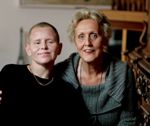 The Nordic Council Welfare Committee has approved Iceland’s proposal to create a team of doctors and scientists to prepare proposals for improvements to spinal cord injury research and treatment.
The Nordic Council Welfare Committee has approved Iceland’s proposal to create a team of doctors and scientists to prepare proposals for improvements to spinal cord injury research and treatment.
The proposal, although submitted by the Icelandic members of the council, is the brainchild of Icelandic nurse and mother of a paralysed daughter, Audur Gudjonsdottir. Since Audur’s daughter suffered a spinal cord injury in 1989, Audur has done everything in her power to raise awareness of the seriousness of spinal cord injury and has campaigned for global unity in searching for a cure.
Audur produced the television programme You Will Never Walk Again, which has been screened in numerous countries and, in cooperation with Dr Laurance Johnston, has created a database on experimental spinal injury treatment in five languages: English, Arabic, Russian, Chinese and Spanish.
In addition, Audur produced the TV advert The Paralysed Puppet in 29 languages, and launched a drive to collect signatures in the Nordic countries to persuade the WHO to lend its aid in finding a cure for spinal cord injury. Audur’s work on behalf of spinal cord injury sufferers, which has gained substantial attention, is entirely voluntary; she works from her kitchen table at home.
Audur says that the proposal will be on the agenda at the Nordic Council’s Annual Session in November, and she hopes there will be no obstacles to the establishment of the team.
“It is vital to create such a working group to enable the launch of a systematic search for a cure for spinal cord injury. The team will need to read the material published on basic spinal cord research and examine the experimental treatments for paralysed people currently in use around the world. The goal is to integrate current scientific knowledge so that the development of a treatment for spinal cord injury can be systematically furthered toward finding a cure,” commeneted Audur.
She says that there is nothing innovative about creating a working group of specialists to assist in resolving complicated medical problems, citing as an example in 1923, when Alexander Fleming published an article on mould which received no attention. During WWII, the Allies established a team of specialists, in cooperation with pharmaceutical companies, to try to discover a drug that would cure infection. The result was penicillin.
“Flemings’ article, published 20 years earlier, was the basic reason that penicillin was discovered,” stated Audur, adding that she is convinced that the basic knowledge, which will make all the difference in finding a cure for spinal cord injury already exists.

[…] The proposal, although submitted by the Read more at IceNews – Daily News […]